
(click the header to read all stories)
Read the articles online:
- A sunset in Bethlehem: Discovering hope in the midst of rubble– Ben Davies
- An advent of peace: Continuing the witness and waiting for God– Stephen Kriss
- Since God is great: Opportunities for peace in the Holy Land– David Landis
- An unpredictable journey: Following the call to bilingual pastoring by Marta Castillo– Marta Castillo
- Living out our committment to peace: Three congregations offer love and hospitality to refugee families– Jessica Walter
- Calling all volunteers: Peaceful Living collaborates with Salford Mennonite Church to meet a growing need– Joe Landis
- Getting out of our comfort zones: This is my story, this is my song– Nate Clemmer
- Telling my story: Sharing hope and a reason to live– Wanda Lindsay
- Philadelphia Praise Center hosts Ramadan feast– Lora Steiner
![]()
Click to View/download the printable PDF

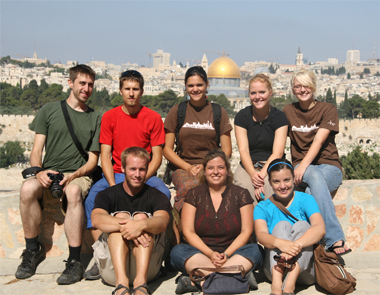 The sun had just finished its descent over Bethlehem and the call to prayer rang crisp in the evening air. I breathed in the sent of Arabic coffee mingling with olives and lime trees while sitting with Samir Sababa on the back porch of the Sababa house.
The sun had just finished its descent over Bethlehem and the call to prayer rang crisp in the evening air. I breathed in the sent of Arabic coffee mingling with olives and lime trees while sitting with Samir Sababa on the back porch of the Sababa house.

 Peace is every step. –Thich Nhat Hanh
Peace is every step. –Thich Nhat Hanh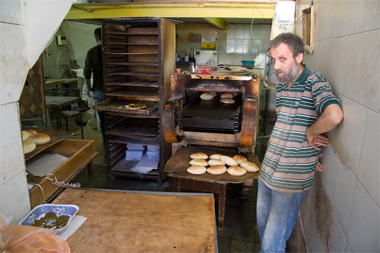 In the morning I often go into the old Nazareth market to buy fresh pita bread for breakfast, where a small bakery is located on the corner near the White Mosque. The bakery is a maze of clockwork conveyor belts that passes dough through the oven, depositing hot puffed pita balloons onto the tray below, where I can watch them deflate as they cool. The store is run by a hunched-over greying Muslim man with glowing eyes. He speaks English well and is always friendly when I come to buy my daily bread.
In the morning I often go into the old Nazareth market to buy fresh pita bread for breakfast, where a small bakery is located on the corner near the White Mosque. The bakery is a maze of clockwork conveyor belts that passes dough through the oven, depositing hot puffed pita balloons onto the tray below, where I can watch them deflate as they cool. The store is run by a hunched-over greying Muslim man with glowing eyes. He speaks English well and is always friendly when I come to buy my daily bread.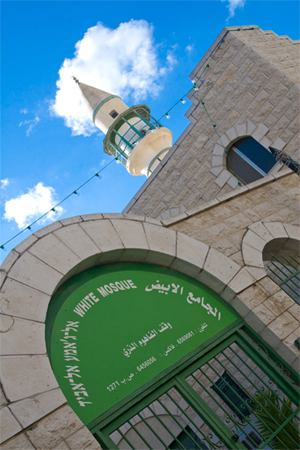 I am challenged by the initiative of the Muslims of Nazareth to extend a hand of coexistent hospitality to their Christian neighbors. I am encouraged by the 138 Muslim scholars, clerics, and intellectuals who came together in October to unanimously declare the common ground between Christianity and Islam in a historic document entitled, “
I am challenged by the initiative of the Muslims of Nazareth to extend a hand of coexistent hospitality to their Christian neighbors. I am encouraged by the 138 Muslim scholars, clerics, and intellectuals who came together in October to unanimously declare the common ground between Christianity and Islam in a historic document entitled, “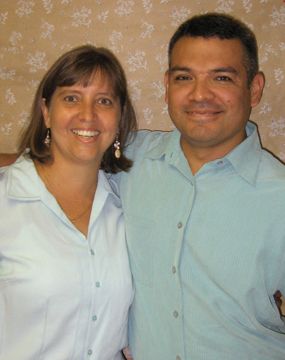 My name is Marta Castillo. The name itself puts me in a box I do not fit. I am not Latina or originally from a Spanish speaking country. Perhaps I should say that my name is Marta (Beidler) Castillo. A few of you may recognize the “Beidler” name. “Beidler” does not, however, elicit images of the bilingual associate pastor that I have recently been called to be at Nueva Vida Norristown New Life Mennonite Church.
My name is Marta Castillo. The name itself puts me in a box I do not fit. I am not Latina or originally from a Spanish speaking country. Perhaps I should say that my name is Marta (Beidler) Castillo. A few of you may recognize the “Beidler” name. “Beidler” does not, however, elicit images of the bilingual associate pastor that I have recently been called to be at Nueva Vida Norristown New Life Mennonite Church.

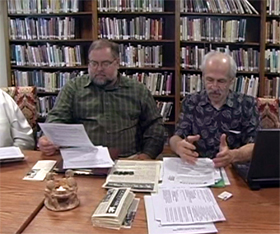 In the 1980’s I began to request volunteers from denominational agencies because I noticed a growing need for human services workers in the area. I had gotten into human services by volunteering myself through Mennonite Central Committee’s (MCC) PAX program. Specifically, I worked with people with disabilities and was an “orderly” in West Berlin, Germany for two years, instead of going to Vietnam. Having experienced a life-influencing time of voluntary service, I thought this would be an excellent opportunity for someone who might be interested in the field. However, this area was considered too wealthy and, with the concept of voluntary service fading in the US, it was increasingly difficult to find volunteers; as a result units were closing and urban area became the focus.
In the 1980’s I began to request volunteers from denominational agencies because I noticed a growing need for human services workers in the area. I had gotten into human services by volunteering myself through Mennonite Central Committee’s (MCC) PAX program. Specifically, I worked with people with disabilities and was an “orderly” in West Berlin, Germany for two years, instead of going to Vietnam. Having experienced a life-influencing time of voluntary service, I thought this would be an excellent opportunity for someone who might be interested in the field. However, this area was considered too wealthy and, with the concept of voluntary service fading in the US, it was increasingly difficult to find volunteers; as a result units were closing and urban area became the focus. I know all of the written and unwritten rules of being a Mennonite. I know what to say and when to say it. I know when it is appropriate to clap in church and even when it is permissible to say “Amen” without causing the entire congregation to turn around.
I know all of the written and unwritten rules of being a Mennonite. I know what to say and when to say it. I know when it is appropriate to clap in church and even when it is permissible to say “Amen” without causing the entire congregation to turn around.